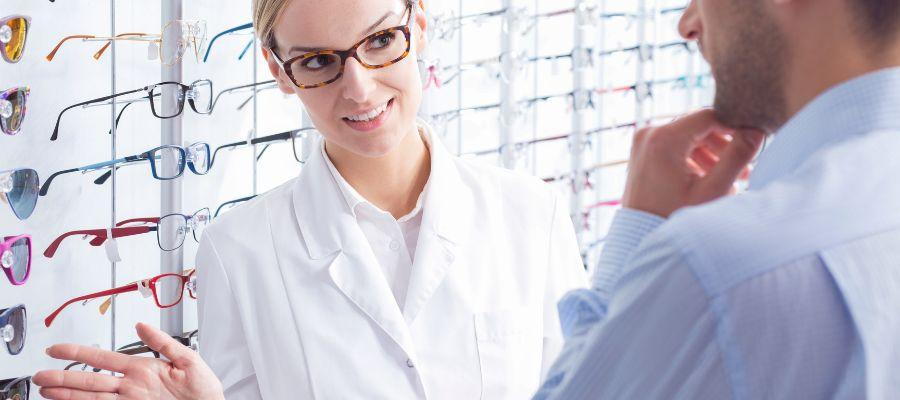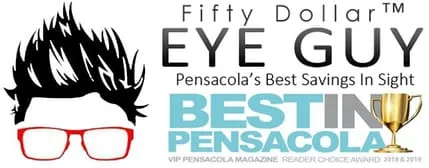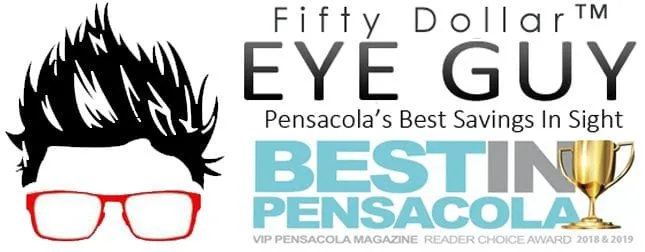
Do I Need A New Prescription For Glasses Or Contact Lenses After An Eye Exam?
Are you contemplating whether a new prescription for glasses or contact lenses is necessary after every eye exam? Here's the scoop: at the 50 Dollar Eye Guy, with two convenient locations in Pensacola, Florida, Dr. Joseph Tegenkamp combines friendliness and professionalism to offer top-notch service to all patients. Valuing personalized care, the clinic's team ensures a comfortable experience for all, taking the time needed for each patient. With a focus on comprehensive eye examinations and a wide range of stylish eyewear, every effort is made to provide you with the best vision care possible. So, let’s explore if and when you might need to refresh your glasses or contacts prescription post your eye exam.
Understanding the Purpose of an Eye Exam
Definition of an eye exam
An eye exam is a thorough evaluation of your eyes and your vision. It's not just about determining whether you need glasses or contact lenses. It's about checking the overall health of your eyes, identifying any potential problems, and suggesting appropriate treatments or preventive measures.
The importance of regular eye exams
Regular eye exams are essential for maintaining good eye health. They can help detect eye conditions such as glaucoma, cataracts, and macular degeneration early when they're easier to treat. Moreover, some systemic issues like diabetes and high blood pressure are often first identified through an eye exam. By having regular eye exams, you're not only looking after your eyes but your overall health as well.
What to expect during an eye exam
During an eye exam, your optometrist will ask about your medical history and any vision problems you might be experiencing. You will undergo several tests that could include a visual acuity test, a refraction test, an examination of the front and back of your eye, and possibly additional tests depending on your specific eye health.
Key Indicators That You May Need a New Prescription
Changes in vision
If you've noticed changes in your vision such as blurred or double vision, difficulty seeing clearly at a distance or near, or seeing halos around lights, it may be time for a new prescription. These changes could indicate that your eyes have changed, and you need new glasses or contact lenses.
Experience of headaches or eye strain
Frequent headaches or eye strain can often be attributed to outdated eyeglass or contact lens prescriptions. If you find your eyes are often tired, or you experience a headache after prolonged reading or computer work, you might need a new prescription.
Difficulty in night driving
Struggling to see clearly while driving at night or experiencing glare from oncoming headlights can be a sign that your prescription needs to be updated. It's an important indicator to get your eyes checked as it can compromise your safety on the road.
Problems with current glasses or contact lenses
If your glasses or contacts no longer provide you with clear vision, or they cause discomfort, it's a clear sign that you need a new prescription. Regular adjustments to your prescription are necessary to ensure optimal vision and comfort.
How Often Should You Have an Eye Exam
Guidelines for different age groups
The frequency of eye exams can depend on your age. Children should have their first comprehensive eye exam at six months of age, then at age three and again at the start of school. For adults, the American Optometric Association recommends eye exams every two years if you're 18 to 60, and annual exams if you're over 60.
Frequency recommendations for those with existing eye conditions
If you have an existing eye condition like glaucoma or macular degeneration, or a systemic condition like diabetes, you may need to have eye exams more frequently. Your optometrist will recommend the best schedule based on your specific condition.
Risks of neglecting regular eye exams
Skipping regular eye exams can have serious consequences. Many major eye diseases have no early symptoms and can be detected only through an eye exam. Without regular exams, these conditions can progress, leading to vision loss or even blindness.
Changes in Eye Health and How They Affect your Prescription
Effects of aging on vision
As you age, your vision naturally changes. You may find that you need glasses for the first time, or if you already wear glasses, that your prescription needs adjusting. Conditions like presbyopia, which makes it harder to see things up close, are common as we age and can be corrected with the right eyewear.
Impact of health conditions like diabetes or high blood pressure on vision
Systemic conditions like diabetes or high blood pressure can have a significant impact on your vision. Both can affect blood vessels in the eyes, causing changes in your vision that can be identified in an eye exam.
Changes in vision due to eye diseases such as glaucoma or macular degeneration
Eye diseases like glaucoma or macular degeneration commonly affect older adults and can lead to significant vision loss. Regular eye exams can help detect these conditions early, potentially preventing severe vision loss.
How Eyeglasses Prescription Works
Understanding the components of an eyeglasses prescription
An eyeglasses prescription is composed of several numbers that indicate the power of lens required to correct your vision. This includes the sphere (degree of nearsightedness or farsightedness), cylinder (degree of astigmatism), and axis (angle of astigmatism).
How optometrists determine prescription strength
To determine the right prescription for you, your optometrist will perform a series of tests during your eye exam. These tests measure how your eyes focus light, how they work together, and how clearly you see at different distances.
How small changes in prescription can impact vision
Even small changes in your prescription can make a significant difference in your vision. You might notice that images are sharper, or that it's easier to read small print or see things at a distance.
How Contact Lens Prescription Works
Key differences between eyeglasses and contact lens prescriptions
It's important to note that a glasses prescription is not the same as a contact lens prescription. Contact lenses sit directly on the eye, so they need different measurements than glasses which sit some distance from the eye.
Variables involved in a contact lens prescription
A contact lens prescription includes similar components as a glasses prescription but also includes measurements for the size and shape of the contact lens.
Understanding the fitting process of contact lenses
The fitting process for contact lenses involves additional steps beyond an typical eye exam. This includes measuring the surface of your eye, trying on sample lenses and checking their fit and movement, and teaching you how to insert and remove the lenses.
Prescription Frequency for Contact Lenses and Glasses
Why contact lens prescriptions often change more frequently
Contact lens prescriptions can change more frequently than glasses prescriptions because contacts are in direct contact with your eyes. This can influence your eye health and, therefore, the type of lens your optometrist recommends.
How often eyeglasses prescriptions typically need updating
For most adults, eyeglasses prescriptions typically need updating every one to three years. However, this can vary based on individual circumstances and it's always a good idea to check with your eye doctor.
Variables that affect prescription frequency
Various factors can influence how often your prescription changes. These include your age, eye health, and how well you care for your glasses or contact lenses.
Choosing Between Glasses and Contact Lenses
Pros and cons of glasses
Glasses have several advantages. They can be easier to use than contact lenses, require less maintenance, and can be a fashionable accessory. However, they can also be uncomfortable, interfere with peripheral vision, and become fogged or smeared in certain weather conditions.
Pros and cons of contact lenses
Contact lenses provide a wider field of vision and won't interfere with physical activities. They also won't fog up or get wet in the rain. However, they require more cleaning and maintenance than glasses, and can sometimes cause discomfort or dry eyes.
Factors to consider when choosing between glasses and contact lenses
When choosing between glasses and contact lenses, consider your lifestyle, your comfort, how much time you have for maintenance, and your personal style.
Professional Vision Care at 50 Dollar Eye Guy
Introduction to Dr. Joseph Tegenkamp
At 50 Dollar Eye Guy, you'll meet Dr. Joseph Tegenkamp, a friendly and professional optometrist. Dr. Tegenkamp is passionate about providing high-quality care to all of his patients.
The commitment to exceptional customer service at 50 Dollar Eye Guy
Every patient at 50 Dollar Eye Guy is treated with exceptional customer service. The staff go above and beyond to ensure every experience is comfortable and personalized, providing the best possible eye care.
Services provided by 50 Dollar Eye Guy
At 50 Dollar Eye Guy, you can count on comprehensive eye exams, a wide selection of fashionable eyewear, and top-notch vision care. It's the one-stop-shop for all your eye care needs.
Scheduling an Eye Exam at 50 Dollar Eye Guy
How to book an appointment
Booking an appointment at 50 Dollar Eye Guy is a breeze. Simply call the clinic and choose a day and time that suits your schedule.
Locations and contact information
50 Dollar Eye Guy has two convenient locations in Pensacola, Florida. You can find them at 5328 N Davis Hwy and 6700 N Davis Hwy. Feel free to call at 850-434-6387 to get in touch.
What to expect at your appointment at 50 Dollar Eye Guy
When you arrive for your appointment at 50 Dollar Eye Guy, you can expect a warm welcome, a thorough eye exam, and personalized care from Dr. Tegenkamp and his team. They look forward to meeting you and helping you achieve your best possible vision.





